2004 BMW 320i cruise control
[x] Cancel search: cruise controlPage 9 of 182

Contents
9
Driving:
Ignition lock65
Starting the engine65
Switching off the engine67
Parking brake67
Manual transmission68
Sequential manual gearbox
SMG*69
Automatic transmission with
Steptronic*73
Turn signal indicator/Headlamp
flasher76
Washer/wiper system/Rain
sensor*77
Cruise control*78
Everything under control:
Odometer80
Tachometer80
Energy control80
Fuel gauge81
Engine coolant temperature
gauge81
Service interval display82
Check Control82
Clock83
Computer*84
Technology for safety and
driving convenience:
Park Distance Control (PDC)*86
Dynamic Stability Control
(DSC)87
Dynamic Stability Control (DSC) –
325xi, 330xi89
Hill Descent Control (HDC)*91
Flat Tire Monitor*92
Brake force display93
Lamps:
Parking lamps/Low beams94
Instrument lighting95
High beams/Standing lamps95
Fog lamps*96
Interior lamps96
Controlling the climate for
pleasant driving:
Air conditioning98
Automatic climate control*102
Roller sun blind*106
Interior conveniences:
Premium sound system*107
Glove compartment107
Storage compartments108
Cellular phone*110
Ashtray, front*110
Ashtray, rear*111
Loading and transporting:
Through-loading system*112
Ski bag*113
Cargo loading114
Roof-mounted luggage
rack*117
Controls and features
Page 20 of 182
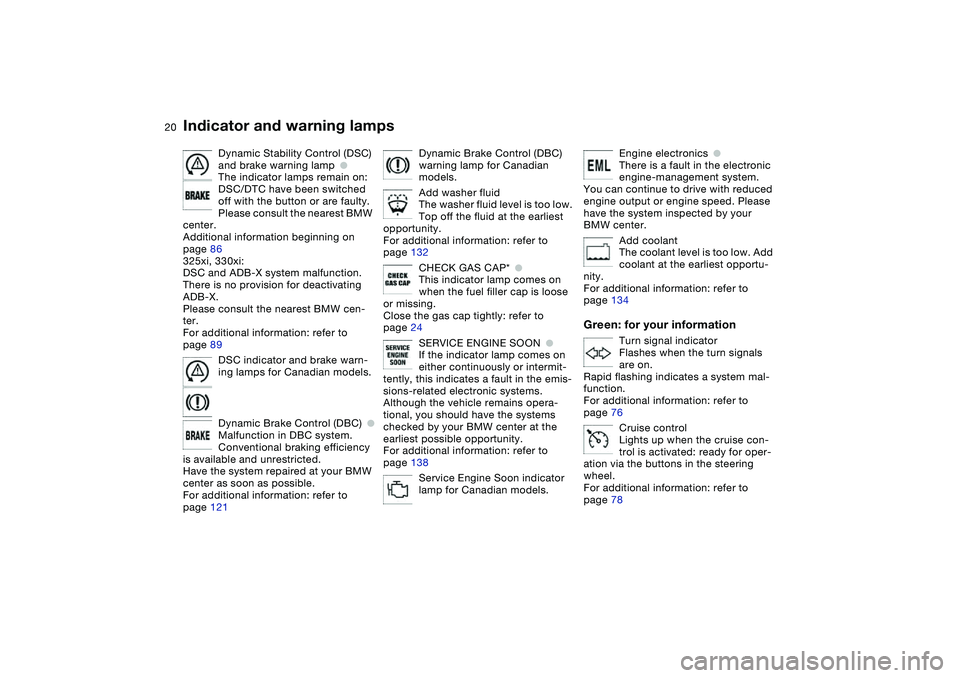
20
Dynamic Stability Control (DSC)
and brake warning lamp
●
The indicator lamps remain on:
DSC/DTC have been switched
off with the button or are faulty.
Please consult the nearest BMW
center.
Additional information beginning on
page 86
325xi, 330xi:
DSC and ADB-X system malfunction.
There is no provision for deactivating
ADB-X.
Please consult the nearest BMW cen-
ter.
For additional information: refer to
page 89
DSC indicator and brake warn-
ing lamps for Canadian models.
Dynamic Brake Control (DBC)
●
Malfunction in DBC system.
Conventional braking efficiency
is available and unrestricted.
Have the system repaired at your BMW
center as soon as possible.
For additional information: refer to
page 121
Dynamic Brake Control (DBC)
warning lamp for Canadian
models.
Add washer fluid
The washer fluid level is too low.
Top off the fluid at the earliest
opportunity.
For additional information: refer to
page 132
CHECK GAS CAP*
●
This indicator lamp comes on
when the fuel filler cap is loose
or missing.
Close the gas cap tightly: refer to
page 24
SERVICE ENGINE SOON
●
If the indicator lamp comes on
either continuously or intermit-
tently, this indicates a fault in the emis-
sions-related electronic systems.
Although the vehicle remains opera-
tional, you should have the systems
checked by your BMW center at the
earliest possible opportunity.
For additional information: refer to
page 138
Service Engine Soon indicator
lamp for Canadian models.
Engine electronics
●
There is a fault in the electronic
engine-management system.
You can continue to drive with reduced
engine output or engine speed. Please
have the system inspected by your
BMW center.
Add coolant
The coolant level is too low. Add
coolant at the earliest opportu-
nity.
For additional information: refer to
page 134
Green: for your information
Turn signal indicator
Flashes when the turn signals
are on.
Rapid flashing indicates a system mal-
function.
For additional information: refer to
page 76
Cruise control
Lights up when the cruise con-
trol is activated: ready for oper-
ation via the buttons in the steering
wheel.
For additional information: refer to
page 78
Indicator and warning lamps
Page 22 of 182
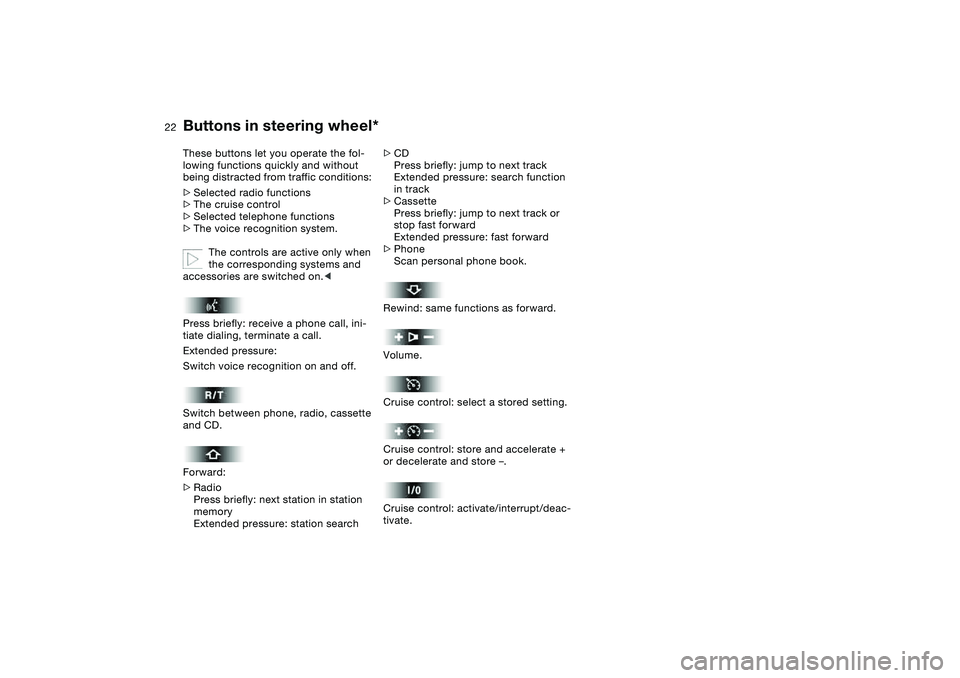
22
Buttons in steering wheel*
These buttons let you operate the fol-
lowing functions quickly and without
being distracted from traffic conditions:
>
Selected radio functions
>
The cruise control
>
Selected telephone functions
>
The voice recognition system.
The controls are active only when
the corresponding systems and
accessories are switched on.
<
Press briefly: receive a phone call, ini-
tiate dialing, terminate a call.
Extended pressure:
Switch voice recognition on and off.
Switch between phone, radio, cassette
and CD.
Forward:
>
Radio
Press briefly: next station in station
memory
Extended pressure: station search
>
CD
Press briefly: jump to next track
Extended pressure: search function
in track
>Cassette
Press briefly: jump to next track or
stop fast forward
Extended pressure: fast forward
>Phone
Scan personal phone book.
Rewind: same functions as forward.
Volume.
Cruise control: select a stored setting.
Cruise control: store and accelerate +
or decelerate and store –.
Cruise control: activate/interrupt/deac-
tivate.
Page 78 of 182

78
Cleaning windshield and
headlamps*0Wipers retracted
1Clean windshield and headlamps*
Do not use the washers if there is
any danger that the fluid will
freeze on the windshield, as your vision
could be obscured. Always use a wind-
shield washer antifreeze in cold
weather. Refer to page 132.
Do not use the washers when the reser-
voir is empty. This could cause damage
to the washer pump.<
The system sprays washer fluid against
the windshield and activates the wipers
for a brief period.
When the vehicle's lighting system is
switched on, the headlamps will also be
cleaned at reasonable intervals.Windshield washer nozzlesThe windshield washer nozzles are
heated automatically* when the ignition
key is in position 2.
Cruise control*Starting at about 20 mph / 30 km/h, you
can maintain and store any vehicle
speed that you specify.
The cruise control is operational when-
ever the engine is running and the sys-
tem has been activated.To activate the systemIn ignition key position 2: press the but-
ton in the steering wheel. The indicator
lamp in the instrument cluster comes
on, refer to page 20. You can now use
the cruise control.
Do not use cruise control on twist-
ing roads, when high traffic den-
sity prevents driving at a constant
speed, or when the road surface is slick
– snow, rain, ice – or loose – rocks or
gravel, sand.
ment cluster goes out.
Cruise control is also deactivated when
the ignition key is in position 0.
Washer/wiper system/Rain sensor*
Page 79 of 182
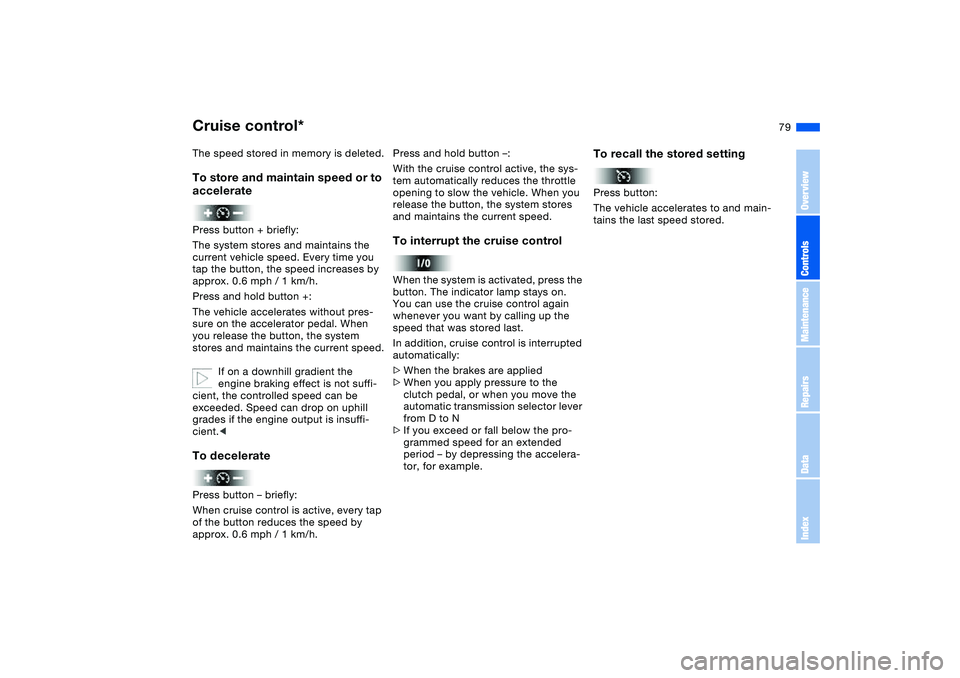
79
The speed stored in memory is deleted.To store and maintain speed or to
acceleratePress button + briefly:
The system stores and maintains the
current vehicle speed. Every time you
tap the button, the speed increases by
approx. 0.6 mph / 1 km/h.
Press and hold button +:
The vehicle accelerates without pres-
sure on the accelerator pedal. When
you release the button, the system
stores and maintains the current speed.
If on a downhill gradient the
engine braking effect is not suffi-
cient, the controlled speed can be
exceeded. Speed can drop on uphill
grades if the engine output is insuffi-
cient.
of the button reduces the speed by
approx. 0.6 mph / 1 km/h.
Press and hold button –:
With the cruise control active, the sys-
tem automatically reduces the throttle
opening to slow the vehicle. When you
release the button, the system stores
and maintains the current speed.To interrupt the cruise controlWhen the system is activated, press the
button. The indicator lamp stays on.
You can use the cruise control again
whenever you want by calling up the
speed that was stored last.
In addition, cruise control is interrupted
automatically:
>When the brakes are applied
>When you apply pressure to the
clutch pedal, or when you move the
automatic transmission selector lever
from D to N
>If you exceed or fall below the pro-
grammed speed for an extended
period – by depressing the accelera-
tor, for example.
To recall the stored settingPress button:
The vehicle accelerates to and main-
tains the last speed stored.
Cruise control*
OverviewControlsMaintenanceRepairsDataIndex
Page 91 of 182
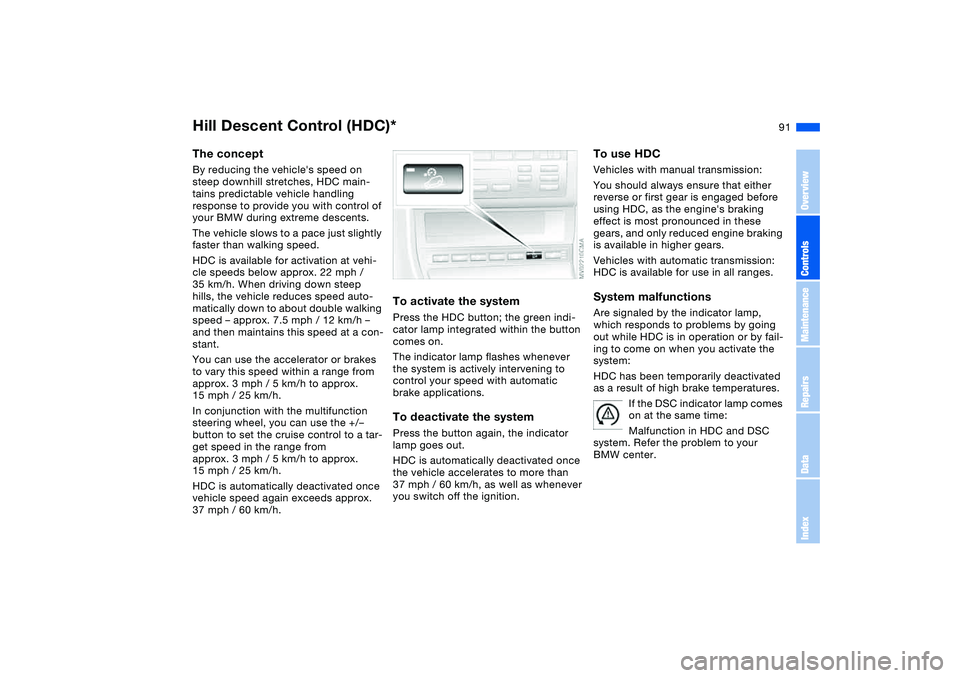
91
Hill Descent Control (HDC)*The conceptBy reducing the vehicle's speed on
steep downhill stretches, HDC main-
tains predictable vehicle handling
response to provide you with control of
your BMW during extreme descents.
The vehicle slows to a pace just slightly
faster than walking speed.
HDC is available for activation at vehi-
cle speeds below approx. 22 mph /
35 km/h. When driving down steep
hills, the vehicle reduces speed auto-
matically down to about double walking
speed – approx. 7.5 mph / 12 km/h –
and then maintains this speed at a con-
stant.
You can use the accelerator or brakes
to vary this speed within a range from
approx. 3 mph / 5 km/h to approx.
15 mph / 25 km/h.
In conjunction with the multifunction
steering wheel, you can use the +/–
button to set the cruise control to a tar-
get speed in the range from
approx. 3 mph / 5 km/h to approx.
15 mph / 25 km/h.
HDC is automatically deactivated once
vehicle speed again exceeds approx.
37 mph / 60 km/h.
To activate the systemPress the HDC button; the green indi-
cator lamp integrated within the button
comes on.
The indicator lamp flashes whenever
the system is actively intervening to
control your speed with automatic
brake applications.To deactivate the systemPress the button again, the indicator
lamp goes out.
HDC is automatically deactivated once
the vehicle accelerates to more than
37 mph / 60 km/h, as well as whenever
you switch off the ignition.
To use HDCVehicles with manual transmission:
You should always ensure that either
reverse or first gear is engaged before
using HDC, as the engine's braking
effect is most pronounced in these
gears, and only reduced engine braking
is available in higher gears.
Vehicles with automatic transmission:
HDC is available for use in all ranges.System malfunctionsAre signaled by the indicator lamp,
which responds to problems by going
out while HDC is in operation or by fail-
ing to come on when you activate the
system:
HDC has been temporarily deactivated
as a result of high brake temperatures.
If the DSC indicator lamp comes
on at the same time:
Malfunction in HDC and DSC
system. Refer the problem to your
BMW center.
OverviewControlsMaintenanceRepairsDataIndex
Page 166 of 182
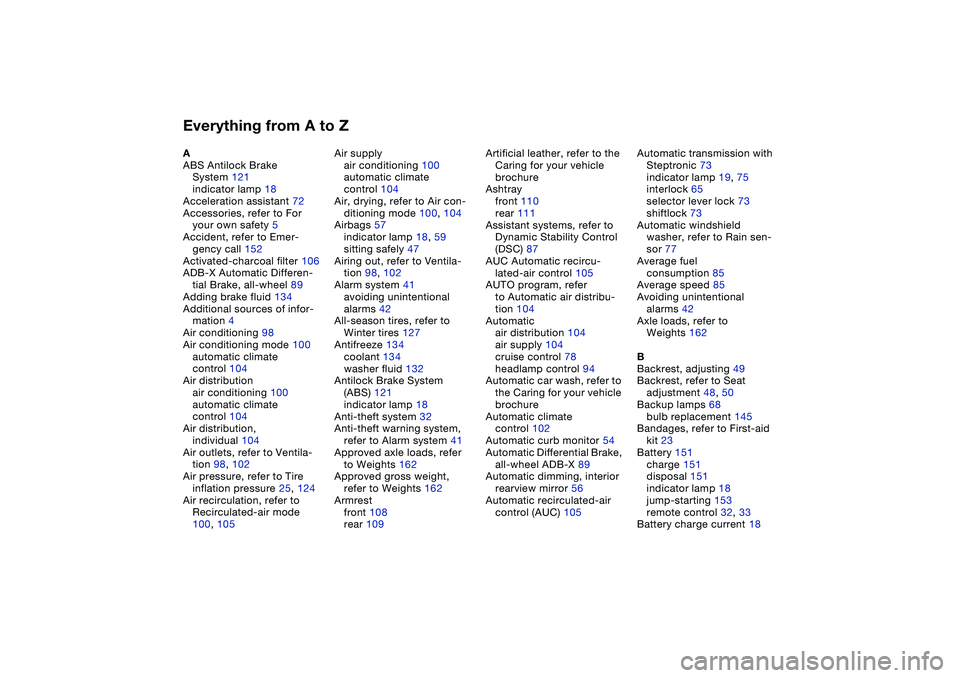
Everything from A to ZA
ABS Antilock Brake
System 121
indicator lamp 18
Acceleration assistant 72
Accessories, refer to For
your own safety 5
Accident, refer to Emer-
gency call 152
Activated-charcoal filter 106
ADB-X Automatic Differen-
tial Brake, all-wheel 89
Adding brake fluid 134
Additional sources of infor-
mation 4
Air conditioning 98
Air conditioning mode 100
automatic climate
control 104
Air distribution
air conditioning 100
automatic climate
control 104
Air distribution,
individual 104
Air outlets, refer to Ventila-
tion 98, 102
Air pressure, refer to Tire
inflation pressure 25, 124
Air recirculation, refer to
Recirculated-air mode
100, 105Air supply
air conditioning 100
automatic climate
control 104
Air, drying, refer to Air con-
ditioning mode 100, 104
Airbags 57
indicator lamp 18, 59
sitting safely 47
Airing out, refer to Ventila-
tion 98, 102
Alarm system 41
avoiding unintentional
alarms 42
All-season tires, refer to
Winter tires 127
Antifreeze 134
coolant 134
washer fluid 132
Antilock Brake System
(ABS) 121
indicator lamp 18
Anti-theft system 32
Anti-theft warning system,
refer to Alarm system 41
Approved axle loads, refer
to Weights 162
Approved gross weight,
refer to Weights 162
Armrest
front 108
rear 109Artificial leather, refer to the
Caring for your vehicle
brochure
Ashtray
front 110
rear 111
Assistant systems, refer to
Dynamic Stability Control
(DSC) 87
AUC Automatic recircu-
lated-air control 105
AUTO program, refer
to Automatic air distribu-
tion 104
Automatic
air distribution 104
air supply 104
cruise control 78
headlamp control 94
Automatic car wash, refer to
the Caring for your vehicle
brochure
Automatic climate
control 102
Automatic curb monitor 54
Automatic Differential Brake,
all-wheel ADB-X 89
Automatic dimming, interior
rearview mirror 56
Automatic recirculated-air
control (AUC) 105Automatic transmission with
Steptronic 73
indicator lamp 19, 75
interlock 65
selector lever lock 73
shiftlock 73
Automatic windshield
washer, refer to Rain sen-
sor 77
Average fuel
consumption 85
Average speed 85
Avoiding unintentional
alarms 42
Axle loads, refer to
Weights 162
B
Backrest, adjusting 49
Backrest, refer to Seat
adjustment 48, 50
Backup lamps 68
bulb replacement 145
Bandages, refer to First-aid
kit 23
Battery 151
charge 151
disposal 151
indicator lamp 18
jump-starting 153
remote control 32, 33
Battery charge current 18
Page 168 of 182
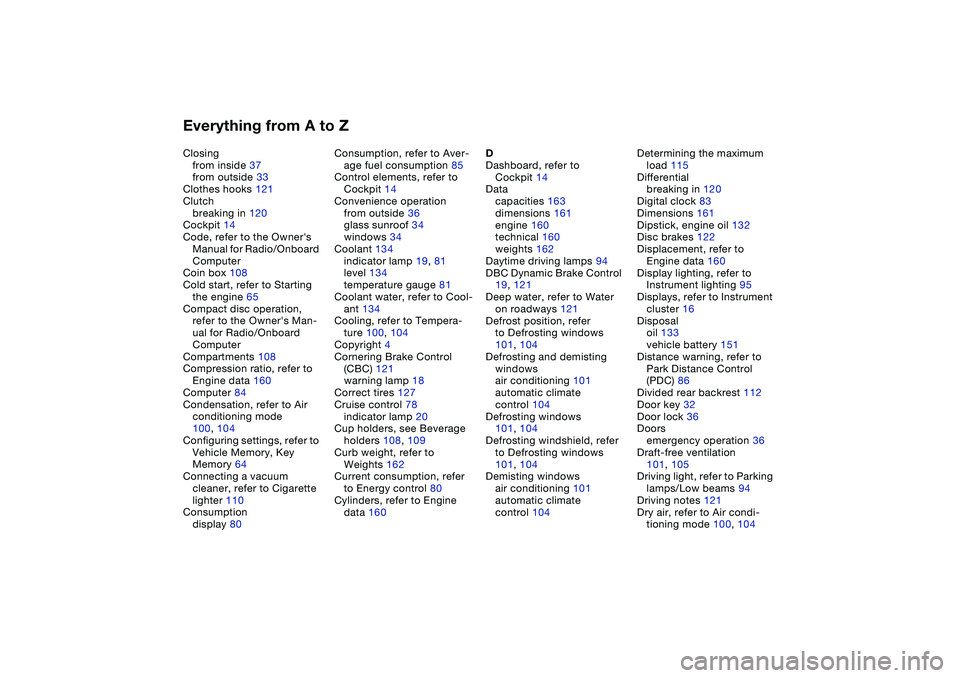
Everything from A to ZClosing
from inside 37
from outside 33
Clothes hooks 121
Clutch
breaking in 120
Cockpit 14
Code, refer to the Owner's
Manual for Radio/Onboard
Computer
Coin box 108
Cold start, refer to Starting
the engine 65
Compact disc operation,
refer to the Owner's Man-
ual for Radio/Onboard
Computer
Compartments 108
Compression ratio, refer to
Engine data 160
Computer 84
Condensation, refer to Air
conditioning mode
100, 104
Configuring settings, refer to
Vehicle Memory, Key
Memory 64
Connecting a vacuum
cleaner, refer to Cigarette
lighter 110
Consumption
display 80Consumption, refer to Aver-
age fuel consumption 85
Control elements, refer to
Cockpit 14
Convenience operation
from outside 36
glass sunroof 34
windows 34
Coolant 134
indicator lamp 19, 81
level 134
temperature gauge 81
Coolant water, refer to Cool-
ant 134
Cooling, refer to Tempera-
ture 100, 104
Copyright 4
Cornering Brake Control
(CBC) 121
warning lamp 18
Correct tires 127
Cruise control 78
indicator lamp 20
Cup holders, see Beverage
holders 108, 109
Curb weight, refer to
Weights 162
Current consumption, refer
to Energy control 80
Cylinders, refer to Engine
data 160D
Dashboard, refer to
Cockpit 14
Data
capacities 163
dimensions 161
engine 160
technical 160
weights 162
Daytime driving lamps 94
DBC Dynamic Brake Control
19, 121
Deep water, refer to Water
on roadways 121
Defrost position, refer
to Defrosting windows
101, 104
Defrosting and demisting
windows
air conditioning 101
automatic climate
control 104
Defrosting windows
101, 104
Defrosting windshield, refer
to Defrosting windows
101, 104
Demisting windows
air conditioning 101
automatic climate
control 104Determining the maximum
load 115
Differential
breaking in 120
Digital clock 83
Dimensions 161
Dipstick, engine oil 132
Disc brakes 122
Displacement, refer to
Engine data 160
Display lighting, refer to
Instrument lighting 95
Displays, refer to Instrument
cluster 16
Disposal
oil 133
vehicle battery 151
Distance warning, refer to
Park Distance Control
(PDC) 86
Divided rear backrest 112
Door key 32
Door lock 36
Doors
emergency operation 36
Draft-free ventilation
101, 105
Driving light, refer to Parking
lamps/Low beams 94
Driving notes 121
Dry air, refer to Air condi-
tioning mode 100, 104